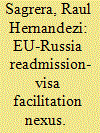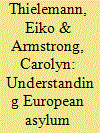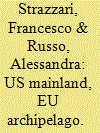| Srl | Item |
| 1 |
ID:
129579


|
|
|
|
|
| Publication |
2014.
|
| Summary/Abstract |
This article questions the effectiveness of EU efforts to prevent terrorism and violent radicalization as well as the future prospects of such efforts. Driven by the pressure of attacks, member states have agreed on a comprehensive strategy to prevent radicalization and recruitment into terrorism, but simultaneously the strategy traces the limits of EU authority in member states in this regard. Meanwhile, the European Commission has focused on indirect measures, such as research support, for counter radicalization. However, over time, both flexible cooperation among a subset of member states and new EU initiatives have generated only few or biased policy outputs. The Stockholm Programme renewed the ambition to prevent terrorism at an early stage and underlined the EU's role in evaluation and knowledge exchange. This article questions the resulting proposal to create a network of local or subnational actors for best practice exchange. The article argues that preventive counterterrorism relies on contentious scientific evidence and that authoritative evaluations remain tied to national policy-making. Finally, the EU Commission cannot mobilize sufficient resources to ensure that 'frontline' organizations, such as police services, implement new practices. Taken together, this limits the potential for depoliticizing multilevel governance approaches to terrorism prevention. The conclusions of this article raise further research questions on the use of knowledge and complex governance patterns in EU internal security.
|
|
|
|
|
|
|
|
|
|
|
|
|
|
|
|
| 2 |
ID:
100925


|
|
|
|
|
| Publication |
2010.
|
| Summary/Abstract |
Despite the lack of cooperation in other issue areas, EU-Russia migration cooperation has been fruitful to the present. The internal security driven EU migration policy towards third countries has so far led to the conclusion of readmission and visa facilitation agreements as policy outputs in Russia. This article looks at the patterns of policy convergence between the EU and Russia in light of the Common Space of Freedom, Security and Justice in the fields of irregular and regular migration. It claims that Russia's leverage vis--vis the Union shaped the migration policy output, in which the visa facilitation regime was introduced as an incentive to readmission. Finally, it stresses the role of Russia in shaping the EU external dimension towards Eastern European countries, once the readmission-visa facilitation nexus has been institutionalised to all the countries in the area.
|
|
|
|
|
|
|
|
|
|
|
|
|
|
|
|
| 3 |
ID:
120831


|
|
|
|
|
| Publication |
2013.
|
| Summary/Abstract |
Recent developments in European Union (EU) asylum cooperation raise important questions about the nature of cooperation and the potential problems facing collective action in the realm of EU internal security. The emergence and the subsequent stability of the Schengen/Dublin system is especially puzzling, given the highly inequitable distribution of costs and benefits that this system entails among the participating states and begs the question as to why those states that are likely to face a disproportionate 'burden' under the system would have agreed to it. This article seeks to provide an alternative approach to answering this question by drawing on a public goods framework. We argue that a simple focus on free-riding and exploitation dynamics, as emphasized in the traditional collective action literature, falls short as an explanation and instead demonstrates how more recent theoretical contributions to the public goods literature can offer new insights into the origin and evolution in cooperation in this sensitive policy area.
|
|
|
|
|
|
|
|
|
|
|
|
|
|
|
|
| 4 |
ID:
134070


|
|
|
|
|
| Publication |
2014.
|
| Summary/Abstract |
The fight against organized crime has become a top security priority for the European Union (EU). While a new policy area is emerging, it is difficult to understand who is in lead and how the process develops. This article delves into the post-Lisbon EU security model, exploring how Washington and Brussels collaborate in combating organized crime in a context of changing definitions, actors and policies. It argues that US definitions, operational models and policies influence EU institutional thinking and policies, shifting the emphasis from prevention and rule of law to execution and intelligence. The dynamics of policy convergence and divergence on criminal matters in the transatlantic community reflect tectonic shifts in the deepest levels of thinking security in the West, affecting the moulding of a European security identity.
|
|
|
|
|
|
|
|
|
|
|
|
|
|
|
|